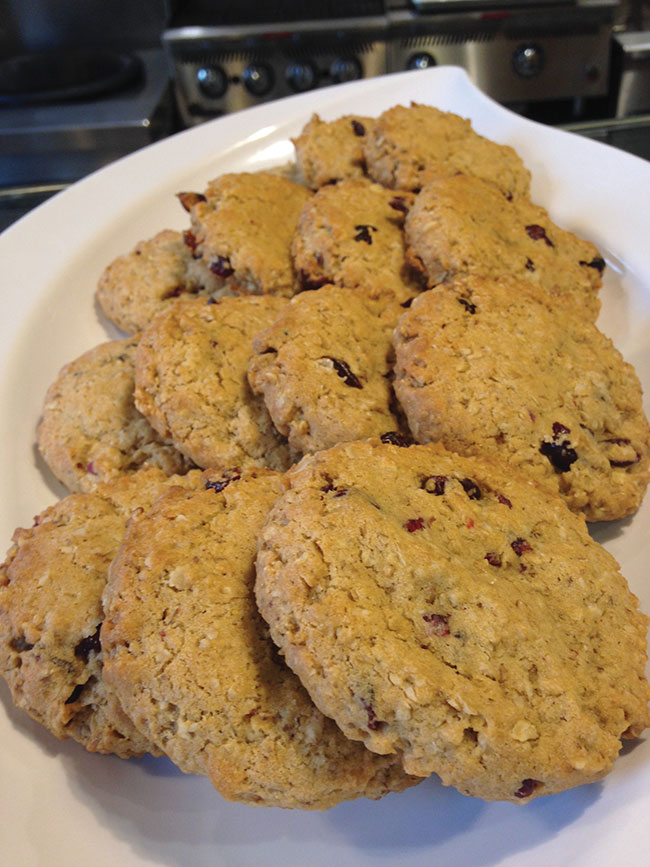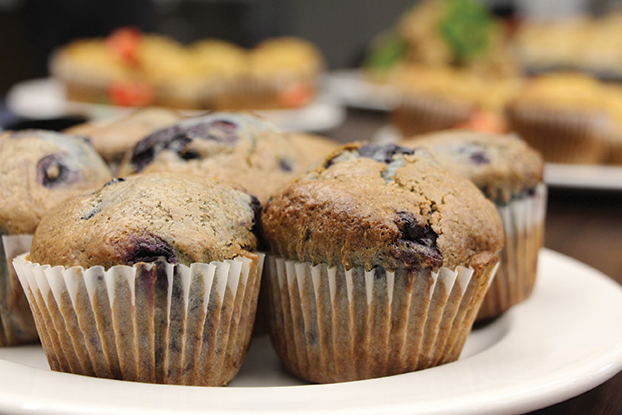
Plant-based baking
October 16, 2020
By François Murphy
Using natural replacements for eggs and butter
 Flaxseed egg replacement yields decadent cookies while adding fibre and Omega-3 nutrients. PHOTO CREDIT: Riana Topan/HSI Canada
Flaxseed egg replacement yields decadent cookies while adding fibre and Omega-3 nutrients. PHOTO CREDIT: Riana Topan/HSI Canada As more and more plant-based products hit the shelves, it seems like everyone is eager to experiment with this innovative new culinary frontier. Baking is no exception, having already seen an influx of non-dairy alternatives to milk and butter for lactose intolerant consumers and those concerned about the environment or animal welfare.
Despite being strongly rooted in traditional recipes and techniques, baking knows no bounds. It’s a timeless art that spans cultures and centuries and nearly everyone is enticed by the smell of freshly-baked goods. As bakers, we can and should strive to continuously expand our repertoires and skillsets. The yeasts that we today take for granted were once just as revolutionary as the new products we see coming to market now.
While not brand new, egg substitutes are still a challenge for some. There have been many attempts over the years at replacing eggs in baking, and manufacturing companies continue to release new commercial varieties, but one of the best alternatives also happens to be one of the simplest and healthiest alternatives: ground flax seeds.
Flax seeds are fascinating for many reasons, but first and foremost is their reaction when mixed with water. The outer shell of the seeds contains hydrocolloids that form a gel when combined with water, much like the consistency of an egg. Simply mix 3 tablespoons of water with 1 tablespoon of ground flax, and let the mixture stand. Within a few minutes, you will have a thick gooey mixture that effectively replaces 1 egg in almost any recipe.
Obviously, eggs perform different functions in baking – they can be emulsifiers, foaming agents or simply help to strengthen the structure of your doughs. The ground flax seed technique works wonderfully well for strengthening any dough structure. In fact, due to their hydrocolloids, a “flax egg” holds in more moisture than an egg would.
Flax will bestow a nutty, earthy flavour to baked items. The seeds will also add a tiny speckled pattern to your dough, so it works best for darker cakes, muffins and more textured cookies rather than for a lighter, uniform pastry. I often train culinary professionals on replacing dairy and eggs in baking, and two of our most popular recipes are plant-based oatmeal cookies and blueberry muffins (recipes below).

Dairy-free blueberry muffins can also be made vegan by using flaxseed to replace eggs. PHOTO CREDIT: Riana Topan/HSI Canada
There are truly no limits when it comes to new, creative products for bakers to tinker with. As Montreal-based baker Joanie Pacquet points out, “Consumers are increasingly concerned with what is put into their food. When they see things they recognize as healthy alternatives, it’s a win-win.”
For Pacquet, flax seeds fit the bill. “Flax seeds – like chia seeds – are known for their abundance of healthy fatty acids including omega 3’s and omega 6’s. They have a lot of great nutritional value to them.” Flax seeds are also high in fibre and contain no cholesterol.
Other egg replacements include chia seeds, applesauce, blended silken tofu, bananas and baking soda and vinegar. Each has their own properties and flavours that will influence the final product: applesauce and banana add a lot of moisture, while baking soda and vinegar are great for leavening.
There are also several options for replacing fats in plant-based baking. Our recipes often use easy-to-source vegetable or coconut oil, or non-dairy margarine. Pacquet, meanwhile, prefers to avoid palm oils and other hydrogenated fats, as these have fallen out of favour with many of her customers.
“If the recipe works with coconut oil and the flavour it brings, I will almost always opt for that over margarine or vegetable shortening. Coconut oil is perfect for achieving a light, flaky crust because it’s very fatty, unlike butter which contains some water and will produce a denser dough.”
Adapting recipes for different fats and oils is simple. Cold coconut oil can be used as a solid to replace shortening, cut into dry ingredients, or it can be melted to substitute melted butter or vegetable oil. Slightly softened coconut oil can also be beaten with sugar the same way you would mix in butter. Unrefined coconut oil will impart a mild coconut flavour, while other oils, such as canola and grape seed oils, are more neutral.
Clearly, when it comes to using alternatives in baking, different substitutions will yield different results. I encourage other bakers to “rise” (pun intended) to the challenge of getting creative and aplaying with the different options and their properties. By adapting your tried-and-true recipes to be free of animal products, you can offer unique products that are still rooted in classic baking, but are more accessible to a wider audience.
As the interest in plant-based food options grows – with consumers looking for healthier and more sustainable choices that do not include animal products – bakers can ensure that everyone can continue to enjoy their creations for centuries to come.
François Murphy is the Chef for Forward Food, a program which helps culinary professionals across Canada serve more delicious and nutritious plant-based options that are better for animals, the environment, and human health.
Print this page
Leave a Reply